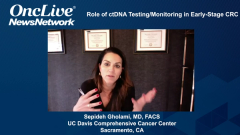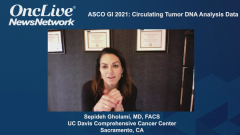
ASCO GI 2021: Circulating Tumor DNA Analysis Data
An overview of data presented at the ASCO GI (American Society of Clinical Oncology Gastrointestinal) 2021 Annual Meeting, regarding the circulating tumor DNA for assessment of recurrence risk, benefit of adjuvant therapy, and early relapse detection after treatment of patients with colorectal cancer (CRC).
Christopher Lieu, MD: We want to talk a little about some exciting data presented at ASCO GI [American Society of Clinical Oncology Gastrointestinal Cancers Symposium]. Dr Gholami, I’m going to let you go first in regard to the abstract titled “Minimal Residual Disease Detection With Circulating Tumor DNA From Personalized Assays in Stage II and III Colorectal Cancer Patients in a UK Multicenter Prospective Study,” the TRACC study. Talk about the study design, some of the findings, and what the implications are from your standpoint.
Sepideh Gholami, MD, FACS: I really like this design. It was a prospective multicenter study that was based in the United Kingdom and included all patients with stage II and III colorectal cancer. It did include a subset of patients with rectal cancer, and about 56% or so of the patients had received adjuvant chemotherapy—this was the study population. All patients got preoperative and postoperative plasma samples collected and then, after surgery, were risk stratified into a high- or low-risk group, based on the clinical pathologic findings that we’re familiar with such as age and laterality of the tumor, like TMB [tumor mutational burden] and MSI [microsatellite instability] status. Their follow-up was about 16 months for the study, and they looked at patients who had minimal residual disease positivity vs minimal residual disease negative.
The relapse rate in the positive group was in the high 40% range vs really the negative group, which had a relapse rate of 8% with a huge hazard ratio difference. Clinically, when we see those numbers, they’re really exciting. For the stage III patients it was very similar: Patients who had positive ctDNA [circulating tumor DNA] had a recurrence rate in the 45% range vs about 16%, 17% in the lower-risk population.
It is the most significant prognostic factor, as you alluded to; it goes way beyond T and N stage. Compared with the risk of relapse that we know for those stage II and III cohorts, the disbursement was about 20% for stage II and 30% for stage III. These are higher numbers when the ctDNA reading is positive or way lower when negative. It’s nice to be able to give patients a more accurate representation of what is going to happen to them compared with these average figures that we go over when the patient presents to you and wants to know their relapse rate.
What is important is to know that their follow-up was 15 months—so we clearly need a longer follow-up to make a big conclusion. If you look at their reading and the way the study was designed, it seems fairly accurate and consistent with the rest of the studies that I would expect. I applaud the authors for doing this study; it was a good study.
Christopher Lieu, MD: It’s neat to see more data coming out showing the incredible prognostic impact of this assay. Of course, the question we always want to ask: Are any of these data predictive?
Sepideh Gholami, MD, FACS: Exactly.
Christopher Lieu, MD: Can we choose the patient population that’s going to benefit from adjuvant therapy? Of course—we don’t have that data, but for some of the ongoing trials we hope we will.
Transcript Edited for Clarity








































